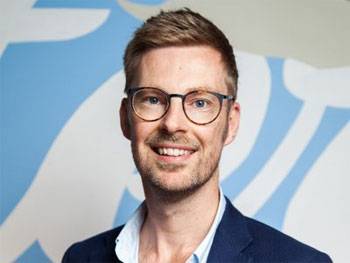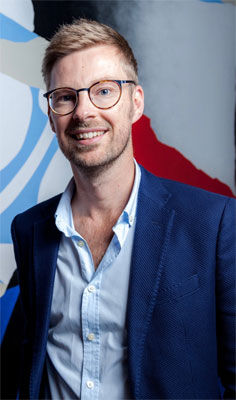Ross Reekie Career Change Interview

Meghan Markle, From Actress to Duchess
By Ross Reekie, Workplace Happiness Expert and Founder of Rise
This weekend Royals, Politicians, and the world's elite will converge in grand celebration. Hundreds of thousands of well-wishers will line the streets of London and compete with a frenzied media pack to get a glimpse of Meghan Markle in the most extravagant job induction of our times. Of course, this work event is unusual in that it also doubles as a wedding. While there is perhaps no more compelling motivation for changing career than true love, will this job make her happy and fulfilled in the long-term and what can we learn from her example?
To answer the question, let's look at it from a meaning of work perspective. As many commentators (or dare I say envious women who missed out on snagging Prince Harry) have pointed out, she has given up her successful acting career, primarily known for the popular Netflix series Suits and lifestyle blog The Tig. This might seem like a very small price to become a Duchess, but doing something that we love and the satisfaction and self-esteem that flow from achievement are huge contributors to experiencing a sense of meaning.
She'll also have to follow Royal protocol and won't be allowed to have an active opinion in politics, which prior, was deeply important to her. Meghan's new uniform will also be less expressive and more conservative to fit the Royal brand. A far cry from her fashionista style back in the day. Authenticity, defined as an alignment between our behavior and perceptions of our true self is a central force for meaning in our lives and work. Without it, we suffer. You may have experienced it if you've ever tried to go against who you really are for very long.
But the naysayers (off with their heads) are missing all the potential for gain in meaning and happiness. Most obviously, Meghan Markle is now a megastar with an enormous platform from which she can make a positive impact on the world. This has always been important to her and it's key for her fulfillment in her new role and changing status. Giving oneself up to something bigger than oneself can foster the deepest sense of meaning that transcends the ego.
For Meghan, and for those of us pondering a career change, even if it's not to become a Prince or Duchess, a new job may not always make us happy in the short-term. However, with a strong motivation (like love) and by connecting our work to a higher purpose, it can bring a deeper sense of meaning, joy, and fulfillment. That is the key to long-term happiness.
Interview with Ross Reekie
Ross is the Founder of Rise and is an expert in meaning and happiness at work, with over 16 years' experience working across management consulting and talent acquisition spaces.
Ross's has extensive experience in shaping the people strategies and senior management teams of major organisations in the construction, property and engineering industries and has delivered assignments at Managing Director, Board and Senior Management levels both internationally and in Australia.
Ross brings a fresh perspective to how people can find happiness at work as he believes that it is only by finding meaningful work that people can be happy. He regularly speaks at career and leadership events, industry forums, and has made guest appearances on international radio shows.
Question: Why do you believe Meghan Markle's career change will bring her more happiness?
Ross Reekie: Meghan Markle has an opportunity to transcend her career and enter into what many philosophers through the ages believe to be the most powerful form of meaningful work and long-term fulfillment - selfless service. She has a strong platform to make a positive impact on the lives of others by supporting causes, and shining a light on injustices. This is something that has been close to her heart and is something she'll be able to pursue further in her new position as a Royal.
 Question: How can we learn to find more happiness in our existing career?
Question: How can we learn to find more happiness in our existing career?
Ross Reekie: One of the best ways to make your current job more satisfying is to reconnect with what is important to you and how your job can help you achieve those things. Becoming more fulfilled might simply be a case of reframing how you think about things, as happiness is dependent on our choices, rather than our circumstances, or maybe you just need to make some minor adjustments to your job or the goals that you've set. I always recommend taking the time to consider why you like your job, what were your hopes and dreams when you started, what gives you a sense of achievement, and how is your work contributing to the company goals? Once you have a greater understanding of these factors, satisfaction and self-esteem can flow naturally and will lead to happiness.
Question: How have millennials begun shaping the workplaces of the future in terms of meaningful work?
Ross Reekie: Millennials are creating a groundswell change in what people want to get out of work. No longer is it ok to work just to make ends meet. Millennials want to connect with a business's purpose to feel part of an organisation that is making a positive impact in the world and not only in it for the money. Millennials make up around half of the Australian workforce, so I expect to see businesses start to sit up and take note of the changing priorities of employees and provide them with more meaningful work and flexibility. If businesses don't adapt they'll struggle to survive and lose great talent from their teams.
Question: Can you share your advice on how to ease stress in the workplace?
Ross Reekie: We see many leading companies offering wellness programs. While these efforts are great, no amount of meditating or apples in the fruit bowl will ease stress if your boss is the root cause of the issue. If you're a leader reading this, you have so much impact over the stress of those in your team. Talk to them regularly, being open and honest is an invaluable step to show how you care about what's most important to them, listen, check-in and give constructive feedback. And if you're a stressed employee, try your best to re-frame the stress. The mind can do incredible things and by shifting thoughts to embrace stress, it can boost work performance without the negative effects on health. Another option is to schedule in regular breaks. People aren't designed to be productive 24/7. Sometimes doing less hours and taking time-out can help destress and achieve better results.
Question: How can we find a new career that will give us more happiness?
Ross Reekie: If you're not happy in your job, it's important to remember that work can be awesome and it can be something that fulfils you. All hope is not lost! If you have no idea what's next and where to start, then my advice is to start small. Explore the things you have an interest in, treat it as a project and see where it leads. The more exploration you can do the better. Perhaps there's a way to pursue an interest as a side project until you work out if it's for you? Or maybe you can learn something new in your current job? Through my research and experience, I've found that the happiest and most fulfilled workers all discovered what they loved doing through exploration.
Question: Would you suggest charity work outside of our paying jobs?
Ross Reekie: Yes! There's so many benefits to doing charity work. Research shows that the act of giving has a profound positive effect on our wellbeing. To maximise the benefit to all stakeholders the key question to ask is how can I best serve my community in a way that is meaningful to me? For some this may be a monthly donation. For others getting their workplace to sponsor an event or support a particular charity is key. Others may be happy to use their profile to bring awareness to an issue. Either way, there's many options to make a difference and it all adds up.
Question: What are other ways we can find long-term happiness?
Ross Reekie: There's a lot of research on happiness and long-term fulfillment. Having meaningful work and feeling connected to an organisation's purpose is a crucial part of being happy, not just at work but in life.
Interview by Brooke Hunter
MORE





